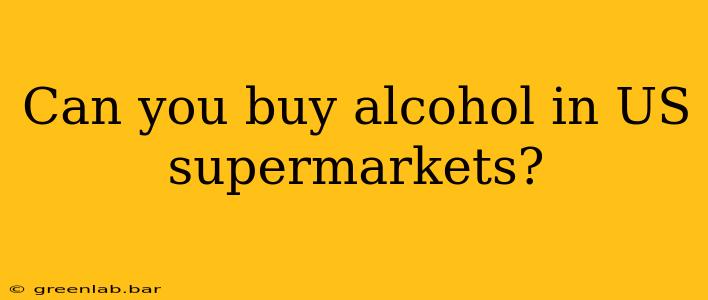The question of whether you can buy alcohol in US supermarkets is a surprisingly complex one. The simple answer is: sometimes. The sale of alcoholic beverages in supermarkets is heavily regulated and varies significantly from state to state, and even within states themselves. This guide will break down the intricacies of alcohol sales in US supermarkets.
The Patchwork of Alcohol Laws Across the US
Unlike many other countries, the United States doesn't have a single, uniform national policy on alcohol sales. Instead, each state (and sometimes even individual counties or cities within a state) sets its own rules. This results in a complex patchwork of regulations that can be difficult to navigate. Some states allow supermarkets to sell a wide range of alcoholic beverages, including beer, wine, and spirits, while others have strict limitations or outright prohibitions.
States Where Supermarket Alcohol Sales Are Common:
Many states have liberalized their alcohol laws in recent years, leading to the widespread availability of alcohol in supermarkets. These states typically allow the sale of beer, wine, and sometimes even spirits, subject to certain restrictions such as permitted hours of sale or limitations on alcohol content. Examples include:
- California: Generally allows the sale of beer and wine in supermarkets, with some local variations.
- Texas: Supermarkets can generally sell beer and wine, but the specific regulations can differ by county.
- Florida: Allows the sale of beer and wine in many supermarkets.
- New York: Allows the sale of beer and wine in many supermarkets.
States with Restrictions or Prohibitions:
Conversely, other states maintain stricter regulations, limiting or prohibiting the sale of alcohol in supermarkets. These restrictions can range from only allowing the sale of beer with low alcohol content to completely prohibiting the sale of alcohol in grocery stores. This is often driven by a combination of historical precedents, local preferences, and concerns about public health and safety. Examples include (but are not limited to):
- Pennsylvania: Alcohol sales are often controlled through state-run stores, with limited exceptions for supermarkets in some areas.
- Utah: Has relatively strict alcohol regulations with limitations on supermarket sales.
- Mississippi: Alcohol sales are often regulated through specific licensing requirements, resulting in limited availability in supermarkets.
- Alabama: A combination of state-run stores and limited licenses make alcohol availability in supermarkets patchy.
Factors Influencing Supermarket Alcohol Sales
Several factors contribute to the variation in alcohol sales regulations across states:
- Historical Precedents: Many states have laws dating back to Prohibition or even earlier, which significantly shaped their current regulatory frameworks.
- Local Politics and Lobbying: The influence of alcohol producers, retailers, and advocacy groups plays a significant role in shaping alcohol laws.
- Public Health Concerns: Concerns about alcohol abuse and underage drinking often drive stricter regulations.
- Economic Considerations: State governments consider the tax revenue generated by alcohol sales, influencing their approach to regulation.
How to Find Out About Your Local Regulations:
The best way to determine whether you can buy alcohol in a supermarket in your specific area is to:
- Check your state's Alcoholic Beverage Control (ABC) website: Each state usually has a dedicated website outlining its alcohol regulations.
- Contact your local government: County or city officials can provide information specific to your region.
- Visit the supermarket's website: Some supermarkets may list their alcohol offerings and relevant restrictions on their websites.
Ultimately, the legality of buying alcohol in US supermarkets hinges on the specifics of your state, county, and even city regulations. It's crucial to consult local laws to ensure compliance before purchasing alcoholic beverages.

